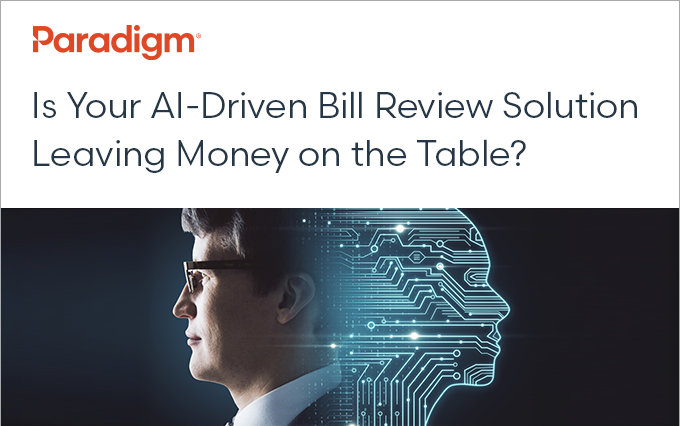03/28/2024

Seemingly overnight, artificial intelligence (AI) has moved from a technology just on the horizon to one transforming every aspect of life. Automation, machine learning, big data, and large language models like ChatGPT are coming together to streamline workflows, improve decision-making, reduce errors, and decrease costs. In the past year, there has been a rush among organizations to come to market with AI solutions that will keep them competitive and ahead of the technological curve.
But as quickly as AI is changing workplaces and sweeping the business world, including the workers’ compensation and health care spaces, there have also been signs that intelligent machines still need supervision by living, breathing people. From automated algorithms potentially denying authorizations for necessary services, to attorneys citing nonexistent cases generated by AI in their legal briefs, a growing list of cautionary tales1 in the news showcases the dangers of relying too much and too quickly on unsupervised, fully automated AI. In contrast, businesses should look to develop an approach to AI backed by domain expertise and careful human oversight, especially in complex, multifaceted areas, such as health care administration and payment integrity.
Surgical implant bill review needs real people with real experience
Surgical implant payment integrity and bill review is a great example of a data-driven area that benefits from algorithmic processes and oversight from experienced personnel leveraging focused expertise. According to research, the medical implant device market is increasing at an annual rate of 6.5%,2 with orthopedic implants alone growing to account for anywhere from 25% to 60%3 of a surgical bill. While much of this growth is due to legitimate technological development, issues including overbilling, missed billing errors, and lack of true acquisition cost transparency are all examples of cost drivers highlighting the need for dedicated implant bill review.
Today, cost containment platforms offering fully automated off-the-shelf, AI-driven solutions promise hands-off, upload-and-go savings. But without human oversight, there is a higher risk of missed savings opportunities; undetected fraud, waste, and abuse; and increased friction with providers and clients. The surgical implant industry is complex and filled with nuances, including regional pricing and manufacturer discounts and/or rebates, that even the most advanced algorithm can miss.
Not only can relying on an AI-only bill review platform possibly increase the chances of provider reconsiderations, but it can also leave payors flying blind when it comes to navigating the defense process. Communication with providers should be conducted by experts who know how to mitigate abrasion and ease administrative burdens. There is still no substitute for bill reviewers with solid industry experience on the manufacturer, provider, and payor side of surgical implants.
Effective AI needs effective training and data
In addition to the human element, it is also critical for bill repricing algorithms to have access to and be trained with the most up-to-date and relevant data. Many payment integrity solutions are based on static universal databases with outdated and overly general implant pricing data. A database can contain millions of lines of data, but much of it may include invoices that don’t reflect the actual manufacturer cost, which can result in missed savings opportunities. Static, universal databases can also contain data for procedures that are not relevant to many payors.
Manufacturer pricing is constantly changing as new devices are introduced and market factors shift. Additionally, regulations and compliance information are constantly changing. To deliver the most consistent and objective reviews, any program needs the ability to add devices and account for the thousands of FDA approvals and new device uses that emerge every year. Automated bill review algorithms using a static database are far more likely to leave savings on the table.
Human expertise and a dynamic database ensure maximum results for AI
For payment integrity, machine learning integrated with a dynamic real-time database and experienced human oversight is a powerful combination. For the foreseeable future, in-house experts will need to be there to defend repricing decisions and handle reconsiderations. Fully automated platforms can often be frustrating for both internal and external end users, leading to higher reconsideration rates, negative adjudications, and poor service interactions.
The payment integrity team at Paradigm brings exceptionally deep experience and expertise to the domain of surgical implant pricing and bill review. Team members include professionals with firsthand ambulatory surgery center experience, former sales representatives for major device manufacturers and distributors, purchasing agents and leads for large implant and surgical equipment providers, as well as trial coordinators for new spinal and orthopedic implants.
“Even as machine learning and artificial intelligence continue to develop at a brisk rate, there is no substitute for years of unmatched industry experience,” said Jason Cooper, Chief Technology Officer, Paradigm. “From former supply chain experts to provider-side purchasing agents, our team has an unmatched ability to analyze surgical implant bills and ensure transparency, accuracy and value,” added CJ Daly, Vice President of Surgical Implant Services, Paradigm.
The human element in action
The ability of AI to perform specific tasks efficiently and accurately is truly impressive, but much of the work needed to deliver cost savings in the complex arena of implant bill review still requires human intelligence and experience in these key competencies:
There is no doubt that AI has transformed and will continue to drive the world of medical billing with enhanced efficiency, reduced errors, and quicker reimbursements. But now, and likely for years to come, there is no automated system that can replace experienced, human decision-making and communication, particularly in the area of payment integrity. By harnessing a platform that combines unparalleled human-driven service and expertise, a highly accurate dynamically updated database, and advanced machine learning, stakeholders can best position themselves to achieve superior cost savings in this quickly growing sector.
Learn about Paradigm Surgical Implant Cost Management and how this expert-driven, data-backed solution delivers cost objectivity and transparency for maximum savings.
Sources: